Contents
- Welcome to the World of Tarot and Journaling
- Benefits of Journaling
- Introducing Tarot
- How Tarot Enhances Journaling
- Getting Started: Tarot and Journaling
- Journaling Prompts and Tarot Spreads
- Integrating Tarot and Journaling into Daily Practice
- A Word of Caution
- Conclusion
-
Frequently Asked Questions
- Can anyone use Tarot for journaling?
- Do I need a specific Tarot deck for journaling?
- How can Tarot enhance self-exploration?
- Can Tarot help me gain a deeper understanding of myself?
- How often should I incorporate Tarot into my journaling practice?
- What is the purpose of setting intentions before a Tarot journaling session?
- How do Tarot spreads enhance the journaling experience?
- Can I journal about relationships using Tarot?
- Is it important to track my progress and discoveries in my Tarot journal?
- Should I rely solely on Tarot for guidance and decision-making?
- References
Welcome to the World of Tarot and Journaling
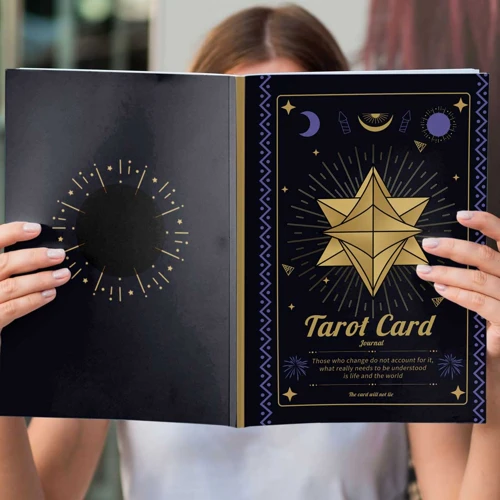
Have you ever wondered how to deepen your journaling practice in a uniquely transformative way? Look no further than the mystical realm of Tarot. Tarot, an ancient divination tool, holds the key to unlocking profound self-reflection, emotional release, and clarity in your writing journey. By incorporating Tarot into your journaling practice, you can tap into intuitive guidance, explore archetypal imagery, and gain a deeper understanding of yourself and the world around you. In this article, we will explore the powerful benefits of journaling, introduce you to the captivating world of Tarot, and guide you through the process of incorporating Tarot into your journaling practice step-by-step. Get ready to ignite your creativity, gain valuable insights, and embark on an exciting journey of self-discovery.
Benefits of Journaling
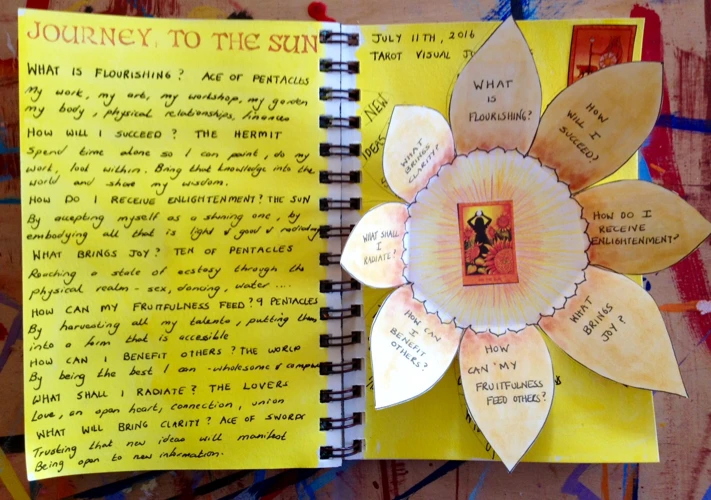
Journaling is a powerful practice that offers numerous benefits for personal growth and self-expression. Through the act of writing, individuals can engage in deep self-reflection, experience emotional release, and gain clarity and insight into their thoughts and feelings. Self-reflection is a key aspect of journaling, allowing individuals to explore their innermost thoughts, desires, and fears. It provides an opportunity for introspection and self-awareness that can lead to personal growth and a deeper understanding of oneself. Emotional release is another significant benefit of journaling, as it allows individuals to express their emotions freely and honestly, providing a therapeutic release and promoting emotional well-being. Journaling offers clarity and insight, allowing individuals to untangle complex thoughts, gain new perspectives, and find meaning in their experiences. Whether writing about daily experiences, dreams and aspirations, or challenges and triumphs, journaling provides a safe and supportive space for self-discovery and personal development. For more tips on how to enhance your journaling practice, check out our Tarot Journaling Tips for Beginners.
Self-Reflection
Self-reflection is a key aspect of journaling that allows individuals to delve into their innermost thoughts, desires, and fears. When engaging in self-reflection through journaling, one can gain a deeper understanding of themselves and their experiences. It provides an opportunity for introspection and self-awareness, leading to personal growth and self-discovery. By asking themselves thought-provoking questions and putting their thoughts and emotions into words, individuals can explore their values, beliefs, and aspirations, helping them align their actions with their true selves. Journaling provides a safe and non-judgmental space to express and analyze one’s thoughts and feelings, allowing for self-expression and emotional catharsis.
Through self-reflection in journaling, one can uncover patterns and themes in their behavior, mindset, and relationships. By writing down their experiences and analyzing them later, individuals can gain insights into their thought processes, recognizing repeated patterns that may contribute to unhealthy habits or limiting beliefs. This awareness allows for personal growth and the opportunity to make positive changes in their lives. Journaling also encourages individuals to reflect on their achievements and successes, fostering a sense of gratitude and self-appreciation.
For those who want to take their self-reflection practice to the next level, incorporating Tarot into journaling can enhance the journey of self-discovery even further. The powerful symbolism and archetypal imagery present in Tarot cards can serve as catalysts for deep introspection and self-exploration. By using Tarot cards as prompts or guidance tools, individuals can tap into their intuition and gain a fresh perspective on their thoughts and emotions. To learn more about how to integrate Tarot into your journaling practice and create a meaningful Tarot journaling ritual, check out our guide on Creating a Tarot Journal Ritual.
Emotional Release
One of the significant benefits of journaling is its ability to facilitate emotional release. Writing down our emotions can provide a cathartic experience, allowing us to express our feelings openly and honestly. Through journaling, we create a safe space where we can pour out our deepest emotions, frustrations, and joys. This act of emotional release can be incredibly therapeutic, helping us to process difficult emotions and experiences. It allows us to release pent-up feelings that may be weighing us down and hindering our personal growth and well-being. By acknowledging and validating our emotions through writing, we can gain a sense of relief and ease. Journaling can serve as an emotional outlet, enabling us to vent our anger, sadness, or anxiety without judgment or inhibition. Through this process, journaling becomes a tool for self-care and emotional self-awareness. If you want to explore this topic further, you can read our article on Exploring Emotions through Tarot Journaling.
Clarity and Insight
One of the profound benefits of journaling is the ability to gain clarity and insight into your thoughts, emotions, and experiences. Writing allows you to externalize your internal world, making it easier to process and understand your thoughts and feelings. When you journal regularly, you create a space for self-reflection and introspection, allowing you to explore the depths of your mind and gain a clearer understanding of your desires, values, and beliefs.
Journaling can bring clarity to situations that feel confusing or overwhelming. As you put pen to paper, you can unravel tangled thoughts and find patterns or connections that were previously hidden. Writing down your thoughts and experiences can help you organize your thoughts and gain a fresh perspective on challenges or dilemmas you may be facing.
Additionally, journaling can provide powerful insights into your own growth and personal development. By documenting your experiences and reflecting on them, you can identify recurring patterns, themes, and behaviors. This awareness gives you the opportunity to make conscious choices and changes in your life, fostering personal growth and transformation.
Journaling can enhance your problem-solving skills. When you write about a problem or challenge, you engage both the analytical left side and the creative right side of your brain. This dual-brain activity can lead to innovative ideas and solutions that may not have surfaced if you had not taken the time to write and reflect.
Ultimately, journaling grants you the gift of self-understanding and self-empowerment. It allows you to tap into your inner wisdom and gain insights that can guide your actions and decisions. The clarity and insight gained through journaling can lead to a greater sense of purpose, direction, and fulfillment in your life.
Introducing Tarot
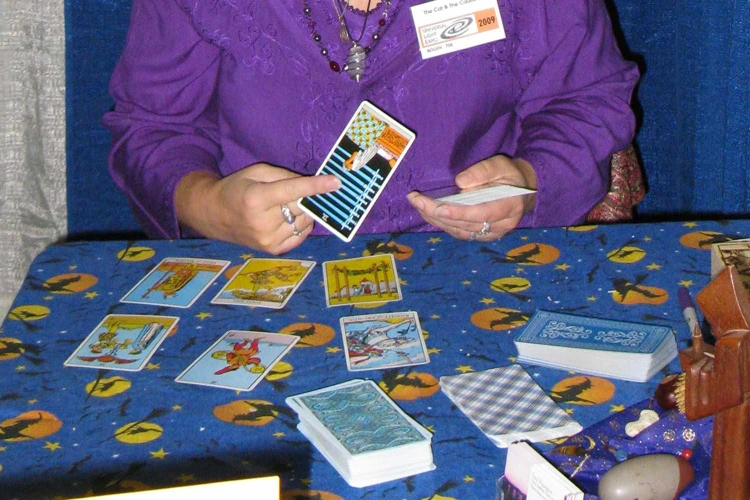
Welcome to the fascinating world of Tarot! Tarot is an ancient divination tool that has been used for centuries to gain insight and guidance. Originating in the 15th century, Tarot decks consist of 78 cards, each with its own symbolic and archetypal imagery. These images have deep meaning and can be interpreted to provide intuitive guidance on various aspects of life. Tarot is often associated with mysticism and fortune-telling, but its true power lies in its ability to unlock hidden truths and provide a mirror to one’s own inner wisdom. When used in combination with journaling, Tarot can enhance the self-exploration process, allowing individuals to delve deeper into their subconscious mind and gain a greater understanding of themselves and their life’s journey. Stay tuned to discover how Tarot can enhance your journaling practice and open new avenues of self-discovery.
An Ancient Divination Tool
Tarot is an ancient divination tool that has been used for centuries to gain insight into the past, present, and future. Originating in the 15th century in Europe, Tarot decks were initially created for playing card games but eventually evolved into a powerful tool for divination. The Tarot deck consists of 78 cards, each with its own unique symbolism and meaning. The deck is divided into two main sections: the Major Arcana and the Minor Arcana. The Major Arcana consists of 22 cards representing significant life events and spiritual lessons, while the Minor Arcana consists of 56 cards that reflect the day-to-day experiences and challenges of life. The imagery on each card is rich in symbolic meaning, drawing upon universal archetypes and themes that resonate with the human psyche. Through the use of Tarot, individuals can tap into their subconscious mind, connect with their intuition, and gain a deeper understanding of themselves and the world around them.
Symbolic and Archetypal Imagery
Incorporating Tarot into your journaling practice opens the door to a world of symbolic and archetypal imagery. Each Tarot card is rich with symbolism and represents universal human experiences and emotions. Symbolic and archetypal imagery found in Tarot cards can tap into your subconscious mind and unlock deeper layers of meaning in your journaling. When you draw a card and observe the intricate details and symbols depicted, you allow your intuition to guide your interpretations and inspire profound insights. For example, the Fool card may symbolize new beginnings and taking risks, while the High Priestess card represents intuition and spiritual wisdom. By exploring and reflecting on these symbols, you gain a deeper understanding of yourself, your experiences, and the world around you. The use of symbolic and archetypal imagery in Tarot can help you uncover subconscious patterns, tap into your creative energy, and expand your perspectives as you journal.
Intuitive Guidance
One of the most fascinating aspects of Tarot is its ability to provide intuitive guidance. Tarot cards are not simply pieces of printed paper; they are gateways to our subconscious minds. Through the symbolism and imagery on the cards, Tarot taps into our intuition and unlocks hidden knowledge and wisdom. When paired with journaling, Tarot can serve as a powerful tool for receiving intuitive guidance. By pulling a card or a series of cards and reflecting on their meaning, we can access our inner wisdom and receive insight into our current circumstances and future possibilities. Tarot acts as a mirror for our subconscious thoughts and feelings, allowing us to uncover hidden truths and gain clarity about our paths. It encourages us to trust our instincts and listen to the whispers of our intuition, guiding us towards informed decisions and actions. When journaling, incorporating Tarot’s intuitive guidance can spark creative ideas, inspire personal growth, and provide a deeper understanding of our own desires and challenges.
How Tarot Enhances Journaling
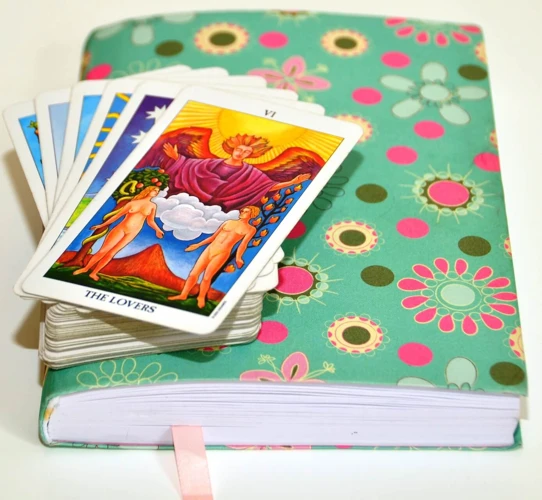
Tarot, with its rich symbolism and intuitive guidance, has the power to enhance and deepen the practice of journaling in profound ways. By incorporating Tarot into your journaling practice, you can experience enhanced self-exploration as the cards act as a mirror reflecting your innermost thoughts and emotions. The symbolic and archetypal imagery found in Tarot cards provides a visual language that can unlock deeper layers of meaning and understanding in your journaling. Through Tarot, you can tap into your intuition and gain deeper insight and understanding about yourself and the situations you are navigating. Tarot also facilitates emotional integration by allowing you to explore your feelings in a structured and supportive way, helping you process and make sense of your emotions. Additionally, Tarot can assist in uncovering patterns and themes in your life, providing valuable insights and guidance for personal growth and transformation.
Enhanced Self-Exploration
Integrating Tarot into your journaling practice can greatly enhance your self-exploration journey. Tarot cards act as powerful catalysts, igniting your imagination and intuition, allowing you to delve deeper into your inner world. The symbolic imagery and archetypal themes present in Tarot provide a rich source of reflection and introspection. Each card holds its own unique meaning and narrative, offering a mirror to your subconscious mind and hidden emotions.
When using Tarot to enhance self-exploration, you can:
- Uncover hidden desires: Tarot cards can reveal hidden desires and passions that may be buried beneath the surface. By exploring the messages and symbolism in the cards, you can tap into your subconscious mind and gain a better understanding of your true desires.
- Explore shadow aspects: Tarot allows you to confront and explore the shadow aspects of your personality. The cards can shed light on your fears, insecurities, and unresolved issues, helping you to bring them into awareness and work towards healing and integration.
- Gain insight into patterns: Through Tarot, you can identify recurring patterns and themes in your life. By noticing these patterns, you can gain insight into why certain situations or emotions keep resurfacing, empowering you to make conscious choices and break free from repetitive cycles.
- Tap into intuition: Tarot is a powerful tool for accessing your intuitive wisdom. By engaging with the cards and listening to your inner voice, you can cultivate a stronger connection to your intuition and trust in your own inner guidance.
By combining Tarot with journaling, you create a dynamic synergy between the two practices, allowing you to explore your inner landscape with depth, creativity, and self-awareness. It opens up a world of possibilities for self-discovery and personal growth.
Deeper Insight and Understanding
One of the most profound benefits of incorporating Tarot into your journaling practice is the opportunity for deeper insight and understanding. Tarot cards are rich in symbolism and archetypal imagery, representing universal themes and experiences that resonate deeply within us. When we use Tarot cards as prompts for our journaling, we tap into the collective unconscious and access a wealth of wisdom and insights.
The images and symbols on Tarot cards can evoke powerful emotions and memories, surfacing subconscious thoughts and feelings that we may not have been aware of. By reflecting on these images and journaling about their significance to us personally, we can gain a deeper understanding of our own thought processes, motivations, and patterns of behavior.
Through Tarot journaling, we are able to explore the different interpretations and meanings of each card, allowing us to gain multiple perspectives and insights. This process of reflection and self-exploration leads to a heightened sense of self-awareness and a deeper connection with our inner selves.
Journaling with Tarot also provides an avenue for self-guidance and empowerment. As we write about our thoughts, feelings, and experiences in relation to the Tarot cards, we can uncover hidden truths, untangle complex emotions, and find clarity in situations that may have seemed confusing or overwhelming.
Emotional Integration
One of the powerful ways that Tarot enhances journaling is through the process of emotional integration. When we engage in journaling with the support of Tarot, we can delve deeper into our emotions and navigate through unresolved feelings. The Tarot cards act as a catalyst, helping us to identify, acknowledge, and process our emotions in a profound and transformative way.
Through Tarot, we can uncover the underlying emotions and experiences that may be influencing our current thoughts and behaviors. The symbolic imagery of the Tarot cards serves as a mirror, reflecting back to us the various aspects of our emotional landscape. By exploring these emotions within the context of our journaling practice, we can begin the process of integration.
Integration involves not only recognizing and understanding our emotions but also accepting and integrating them into our overall sense of self. It allows us to make peace with our emotions and release any resistance or judgment we may have towards them. By embracing our emotions and giving them a voice through journaling, we can achieve a greater sense of emotional well-being and empowerment.
Incorporating Tarot into our journaling practice provides us with a structured framework to explore our emotions. By pulling specific cards and reflecting on their meanings, we can gain deeper insights into our emotional experiences and patterns. We can ask ourselves questions such as “What is the root cause of this emotion?” or “What is this emotion trying to teach me?”
As we journal about our emotions, we can process and release any pent-up feelings, allowing ourselves to heal and grow. This integration allows us to become more aligned with our authentic selves, fostering a sense of inner harmony and emotional balance. Through the combination of Tarot and journaling, we can create a safe and supportive space to explore and integrate our emotions, leading to personal transformation and healing.
Uncovering Patterns and Themes
One of the fascinating aspects of incorporating Tarot into your journaling practice is the ability to uncover patterns and themes in your life. As you draw cards and record their meanings and interpretations in your journal, you may start to notice recurring symbols, numbers, or themes that appear across multiple readings. These patterns and themes can offer valuable insights into your life’s journey, revealing recurring patterns of behavior, recurring challenges, or recurring opportunities. By diligently documenting these patterns and themes in your journal, you can gain a deeper understanding of yourself and the patterns that shape your experiences.
For example, you may consistently draw cards that relate to relationships or career aspirations, indicating that these areas of your life hold significant importance for you. Or perhaps you notice a pattern of cards representing personal growth and transformation, suggesting that you are going through a period of profound change and evolution. By recognizing and acknowledging these patterns, you can gain a greater sense of self-awareness and make conscious choices that align with your desires and values.
Additionally, uncovering patterns and themes can also help you identify areas of your life that may need attention or healing. If you consistently draw cards that signify emotional turmoil or unresolved issues, it may be an indication that you need to delve deeper into these areas of your life and actively work towards resolution and healing. The Tarot serves as a powerful tool for self-discovery, and by recording and reflecting on the patterns and themes that emerge, you can navigate life’s challenges with greater clarity and purpose.
Remember to approach the process of uncovering patterns and themes with an open mind and a willingness to dive deep into your subconscious. Be curious and observant as you analyze your Tarot readings and journal entries, and trust that the patterns and themes that emerge hold valuable insights for your personal growth and transformation.
Getting Started: Tarot and Journaling
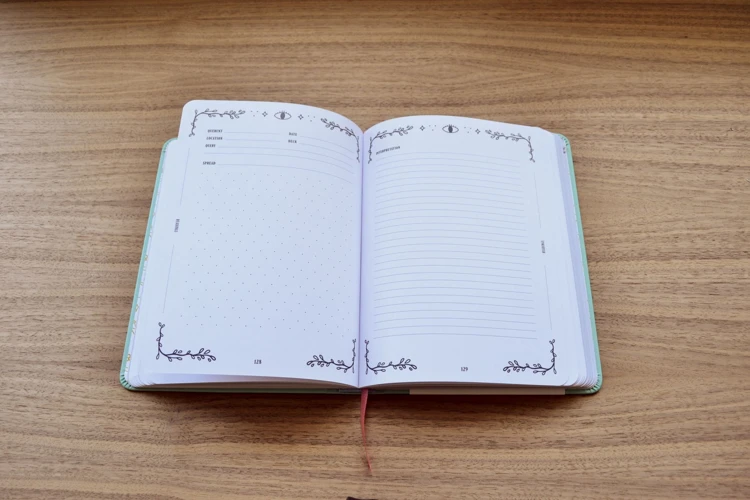
To begin incorporating Tarot into your journaling practice, it’s important to get started on the right foot. Here are some essential steps to consider:
- Selecting a Tarot Deck: Choose a deck that resonates with you and speaks to your intuition. Consider the imagery, symbolism, and overall aesthetic that captures your attention and sparks your curiosity.
- Creating the Right Environment: Set up a sacred and peaceful space for your Tarot and journaling sessions. Clear your surroundings of distractions and create a calming atmosphere that allows you to fully immerse yourself in the process.
- Setting Intentions for Your Journaling Session: Before diving into your Tarot reading and journaling, take a moment to set clear intentions. Ask yourself what you hope to gain from the session, whether it’s guidance, self-discovery, or a deeper understanding of a specific issue.
- Choosing a Tarot Spread: Select a Tarot spread that aligns with your intentions and the questions you want to explore. Whether it’s a simple three-card spread or a more complex spread, choose one that resonates with you and enhances your journaling experience.
By following these steps, you can lay a solid foundation for your Tarot and journaling practice, ensuring a meaningful and transformative experience. For more guidance on creating a sacred Tarot journaling ritual, check out our article on Creating a Tarot Journal Ritual.
Selecting a Tarot Deck
When it comes to selecting a Tarot deck for your journaling practice, it’s important to choose one that resonates with you and speaks to your intuition. There are countless Tarot decks available, each with its unique artistic style, symbolism, and energy. Take your time to explore different decks and find the one that truly captures your attention and ignites your curiosity. Pay attention to the artwork and imagery, as they play a vital role in your connection with the cards. Some decks may have classic, traditional artwork, while others may feature more contemporary or abstract designs. Consider whether you prefer a deck that aligns with a particular theme or tradition, such as the Rider-Waite-Smith deck or a deck inspired by a specific mythology. Trust your intuition and choose a deck that resonates with you on a deeper level. It’s also helpful to read reviews or seek recommendations from experienced Tarot readers or fellow enthusiasts. Remember, there are no right or wrong choices when it comes to selecting a Tarot deck – the most important aspect is that it sparks inspiration and invites a meaningful connection for your journaling practice. For tips on creating a sacred space for your Tarot and journaling sessions, explore our article on Creating a Tarot Journal Ritual.
Creating the Right Environment
Creating the right environment for your tarot and journaling practice can greatly enhance your experience and connection with the cards. Start by finding a quiet and comfortable space where you can focus without distractions. Consider lighting some candles or dimming the lights to create a soothing ambiance. You may also want to play soft instrumental music to help create a relaxed atmosphere. Make sure you have a clean and uncluttered surface to work on, whether it’s a table or a designated journaling space. Having a dedicated space for your tarot deck, journal, and any other tools you may use, such as crystals or incense, can help set the intention for your practice. Consider decorating your space with meaningful objects or symbols that inspire you and reflect your spiritual journey. It’s essential to create an environment that feels sacred and inviting, as it will help you enter a focused and receptive state of mind. Remember, the environment you create should be a reflection of your unique preferences and intentions, so feel free to personalize it to your liking.
Setting Intentions for Your Journaling Session
Before diving into your journaling session with Tarot, it’s essential to set clear intentions. This step will help focus your energy, guide your exploration, and maximize the benefits of combining Tarot and journaling. Here are some tips to help you set powerful intentions:
- Be clear and specific: Clearly define what you hope to achieve or explore during your journaling session. Is it gaining clarity on a particular situation, seeking guidance on a challenge, or understanding your emotions better? Being specific can help you stay focused and achieve your desired outcomes.
- Set a positive tone: Frame your intentions in a positive light. Instead of focusing on what you want to avoid or eliminate, focus on what you want to attract or manifest. This positive approach can help shift your mindset and attract more empowering insights.
- Connect with your emotions: Tune into your emotions and desires while setting your intentions. Ask yourself how you want to feel during and after your journaling session. Do you seek clarity, peace, empowerment, or healing? Aligning your intentions with your emotional needs can make your journaling experience more fulfilling.
- Visualize the outcome: Take a moment to visualize the desired outcome of your journaling session. Imagine yourself gaining insights, feeling inspired, or finding resolutions. Visualization can strengthen your intentions and create a more powerful and impactful journaling experience.
By setting clear intentions before your journaling session with Tarot, you create a focused and purposeful space for self-exploration and growth. These intentions act as a compass, guiding your journey and inviting meaningful insights to surface.
Choosing a Tarot Spread
When incorporating Tarot into your journaling practice, selecting the right Tarot spread can help guide and focus your exploration. A Tarot spread is a specific layout or arrangement of Tarot cards that provides a framework for interpreting their meanings and connections. Here are some essential factors to consider when choosing a Tarot spread:
- Intention: Consider the purpose or intention behind your journaling session. Do you seek clarity on a specific situation, insight into your emotions, or guidance for personal growth? Aligning your intention with a corresponding Tarot spread can enhance the relevance and effectiveness of your journaling practice.
- Complexity: Choose a Tarot spread that aligns with your level of experience and comfort with the Tarot. For beginners, simpler spreads with fewer cards can be less overwhelming, while more experienced Tarot readers might prefer complex spreads that offer a deeper exploration of multiple aspects of their lives.
- Theme: Some Tarot spreads are designed to focus on specific themes or areas of life, such as love, career, or personal development. Consider which areas of your life you would like to explore and choose a Tarot spread that aligns with your current interests or questions.
- Intuition: Trust your intuition when selecting a Tarot spread. If a particular spread resonates with you on a deep level or intuitively feels right, go with that choice. The Tarot is a powerful tool for self-discovery, and your intuition can guide you towards the most relevant spread for your journaling practice.
Remember, selecting a Tarot spread is a personal choice, and there is no right or wrong answer. Experiment with different spreads and notice which ones resonate with you the most. Allow yourself to be open to the guidance and insights that each spread offers as you dive into the realms of Tarot and journaling.
Journaling Prompts and Tarot Spreads
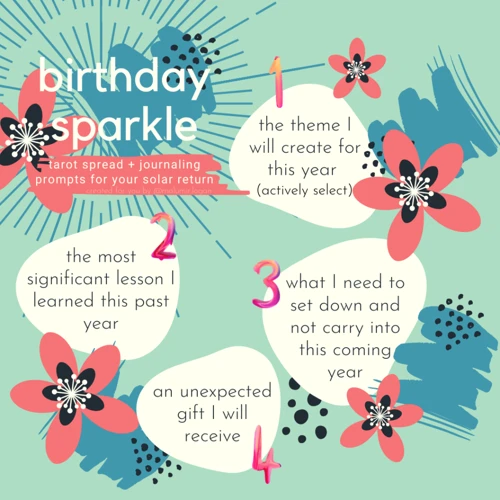
Journaling prompts and Tarot spreads are valuable tools that can enhance your journaling practice and deepen your connection with Tarot. By combining the two, you can unlock a world of self-exploration and gain deeper insights into your thoughts, emotions, and experiences. Reflecting on Major Arcana Cards allows you to delve into archetypal energies and explore themes of personal growth and spiritual development. Each card represents a different aspect of the human experience, offering guidance and wisdom for your journaling practice. Exploring Minor Arcana Cards delves into the everyday aspects of life, such as relationships, work, and personal challenges. These cards provide specific insights and guidance for different areas of your life, allowing you to gain clarity and perspective. Discovering Relationship Dynamics with Tarot prompts help you explore the dynamics in your relationships, offering insights into patterns, strengths, and areas for growth. Finally, Seeking Guidance for Personal Growth prompts encourage you to seek guidance from the Tarot on matters of personal development and self-improvement. By incorporating Tarot spreads and journaling prompts into your practice, you can tap into the rich symbolism and wisdom of the cards, deepening your understanding of yourself and the world around you.
Reflecting on Major Arcana Cards
Major Arcana cards in Tarot hold deep symbolism and represent significant life lessons and archetypal energies. They offer a rich source of inspiration and introspection for your journaling practice. Begin by selecting a Major Arcana card from your Tarot deck, focusing on the image and the feelings it evokes.
1. Card Description: Start by describing the card in detail. Take note of the colors, symbols, and figures present. What emotions or thoughts arise as you examine the card? Write down your initial impressions and any personal connections you sense.
2. Personal Interpretation: Reflect on how the card’s meaning relates to your current situation or life journey. Consider the themes and lessons associated with the card and how they resonate with your own experiences. Write about any insights or revelations that arise during this reflection.
3. Journaling Prompts: Use prompts to further explore the card’s meaning and message. For example, you could ask yourself: How does this card reflect aspects of my personality or life? What challenges or opportunities does it present? How can I apply the card’s teachings to my current circumstances?
4. Creative Expression: Engage in creative expression inspired by the Major Arcana card. You may choose to draw, paint, or write a poem based on the card’s imagery and symbolism. Allow your intuition to guide you as you connect with the card on a deeper level.
5. Closing Thoughts: Conclude your reflection by summarizing any key insights or messages you’ve gained through your exploration of the Major Arcana card. Consider how you can apply these insights to your personal growth and development moving forward.
Reflecting on Major Arcana cards in your journaling practice can be a transformative experience that deepens your understanding of yourself and the world around you. It allows you to tap into the wisdom held within the Tarot deck and gain valuable insights for your personal journey.
Exploring Minor Arcana Cards
When it comes to exploring the Minor Arcana cards in Tarot, you delve into the intricate details of everyday life and the human experience. The Minor Arcana consists of four suits: Cups, Wands, Swords, and Pentacles. Each suit represents different aspects of life, emotions, passions, intellect, and material concerns, respectively. Through your journaling practice, you can dive deeper into the meanings and symbolism of these cards and reflect on how they relate to your own journey. Start by selecting a Minor Arcana card that resonates with you or captures your attention. Examine the imagery, colors, and symbols present in the card. Ask yourself what emotions, situations, or themes it evokes within you. Write down these observations and journal about how they mirror your own experiences or offer guidance and insights. You can also explore the numerology associated with the card, as each number carries its own significance and energy. By consistently reflecting on and journaling about the Minor Arcana cards, you can uncover patterns, identify recurring themes in your life, and gain a deeper understanding of yourself and your path.
Discovering Relationship Dynamics with Tarot
Tarot can be a powerful tool for gaining insights into the dynamics of your relationships, whether romantic, platonic, or familial. By using Tarot cards as a lens, you can uncover hidden patterns, explore underlying emotions, and gain a deeper understanding of the dynamics at play.
When using Tarot to explore relationship dynamics, start by selecting a Tarot spread specifically designed for this purpose. A popular spread is the Relationship Spread, which consists of multiple cards representing different aspects of the relationship, such as communication, trust, and compatibility. Lay the cards out in the designated positions and reflect on each card’s meaning within the context of the relationship.
As you delve into the cards, pay attention to the symbolism and archetypal images present. Each card holds its own significance and can shed light on different aspects of the relationship. For example, the Lovers card may indicate a deep romantic connection, while the Three of Swords could suggest emotional conflicts or challenges.
Take note of any patterns that emerge across multiple readings. Are there recurring themes or similar cards that appear? These patterns can provide valuable insights into the dynamics and recurring patterns in your relationships. They can also guide you in identifying areas that may need attention or growth.
However, it’s important to remember that Tarot is a tool for self-reflection and guidance, not a predictor of the future or a substitute for open communication. The cards can provide valuable insights and perspectives, but ultimately, it is up to you to apply these insights to your relationships and take action as you see fit.
By incorporating Tarot into your journaling practice, you can gain a deeper understanding of the dynamics at play in your relationships, foster self-awareness, and ultimately, make more informed choices in your interactions with others.
Seeking Guidance for Personal Growth
Seeking Guidance for Personal Growth: Tarot can be an invaluable tool for those who are seeking guidance and insights to support their personal growth journey. By using Tarot cards as prompts for journaling, you can tap into the wisdom of the cards to gain guidance and clarity on various aspects of your life. When seeking guidance for personal growth, it’s helpful to choose a Tarot spread that focuses on self-awareness and personal development. For example, you can use a spread that explores your current strengths and weaknesses, your potential areas of growth, and the steps you can take to overcome obstacles and achieve your goals. As you shuffle the cards and lay them out, pay attention to the symbols, colors, and imagery on each card. Reflect on how these elements resonate with your current situation and what messages they have for you. Write down your thoughts and interpretations in your journal, allowing yourself to dive deep into self-reflection and understanding. Through this process, Tarot can provide you with valuable insights, guidance, and support as you navigate your personal growth journey.
Integrating Tarot and Journaling into Daily Practice
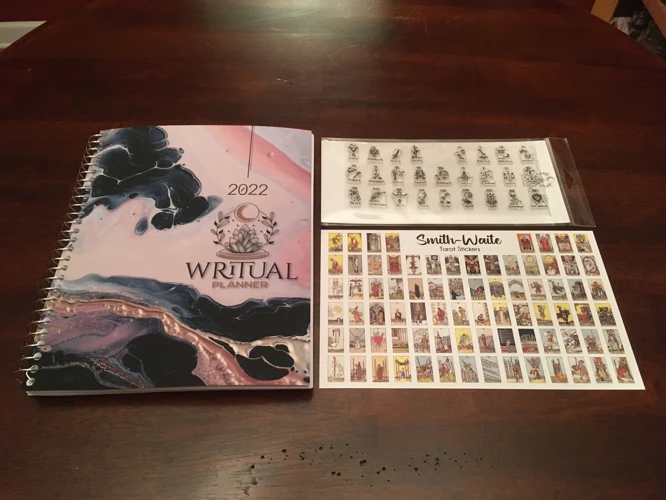
Integrating Tarot and journaling into your daily practice can greatly enhance the depth and meaning of your self-exploration. By creating a routine that incorporates both Tarot readings and journaling, you can establish a powerful synergy between these practices. Start by setting aside dedicated time each day for your Tarot and journaling session, allowing yourself to fully immerse in the experience. Consider tracking your progress and discoveries in a journal or using a bullet journaling system to keep a record of your insights and reflections. Sharing and discussing your Tarot readings and journal entries with others who have a similar interest can also be a rewarding way to deepen your understanding and gain new perspectives. Remember to honor your intuition and personal interpretation throughout the process, using Tarot as a tool rather than relying solely on it. By integrating Tarot and journaling into your daily practice, you can embark on a transformative journey of self-discovery and personal growth.
Creating a Routine
Establishing a consistent routine is essential for incorporating Tarot and journaling into your daily practice. By creating a regular schedule, you are more likely to engage in your practice consistently and make it a habit. Here are some helpful tips to guide you in creating a routine:
- Choose a specific time: Select a time of day that works best for you and commit to it. Whether it’s the morning, afternoon, or evening, find a time when you can dedicate uninterrupted focus to your Tarot and journaling practice.
- Create a sacred space: Designate a special area in your home where you can perform your practice. Clear the space of any distractions and fill it with meaningful objects, such as crystals, candles, or incense, to enhance the ambiance and create a sacred atmosphere.
- Set intentions: Before each session, take a few moments to set intentions for your Tarot and journaling practice. Focus on what you hope to achieve, whether it’s gaining clarity, seeking guidance, or exploring specific aspects of your life.
- Prepare your materials: Keep your Tarot deck, journal, and any other writing tools within easy reach. Having everything readily accessible will make it easier and more convenient to dive into your practice when your scheduled time arrives.
- Stay consistent: Consistency is key to establishing a routine. Aim to engage in your Tarot and journaling practice at the same time every day or on specific days of the week. Stick to your schedule as much as possible and be patient with yourself as you build this new habit.
By creating a routine for your Tarot and journaling practice, you are setting yourself up for success. Consistency will not only deepen your connection with the Tarot cards but also enhance your self-reflection and personal growth. Remember to be flexible with your routine and make adjustments as needed to accommodate changes in your schedule or personal preferences.
Tracking Progress and Discoveries
Tracking your progress and discoveries is an essential aspect of integrating Tarot and journaling into your daily practice. By keeping a record of your Tarot readings and the insights gained during your journaling sessions, you can observe patterns, track personal growth, and identify areas of focus for future exploration.
One way to track your progress is to maintain a Tarot journal or a dedicated section in your regular journal specifically for recording your Tarot readings. Here, you can write down the date, the Tarot spread used, and a detailed description of the cards drawn. Take note of any intuitive thoughts or emotions that arise during the reading, as well as any significant insights or messages you receive.
In addition to recording the details of your readings, it can be helpful to reflect on and summarize your overall impressions and key takeaways. Write about any recurring themes, patterns, or symbols that emerge in your readings over time. Notice any shifts in perception, changes in behavior, or newfound clarity that result from your Tarot and journaling practice.
By regularly reviewing your Tarot journal, you can observe how your interpretations deepen and evolve. You may start to notice recurring symbols or archetypes, which can offer valuable insights into your personal journey. Recognizing patterns and themes can help you gain a deeper understanding of yourself and the underlying forces at play in your life.
Remember to celebrate your progress along the way. Acknowledge any breakthroughs, aha moments, or personal transformations that occur as a result of your Tarot and journaling practice. By tracking your progress and discoveries, you create a roadmap of personal growth, allowing you to see how far you’ve come and inspiring you to continue your exploration.
Once you have immersed yourself in the world of Tarot and journaling, consider sharing and discussing your experiences with others. This can be a transformative aspect of your practice, as it allows you to gain new insights, perspectives, and interpretations. One way to engage in sharing and discussion is to join a Tarot or journaling community, either online or in person. These communities provide a supportive and collaborative space where you can connect with like-minded individuals who share a passion for Tarot and journaling. You can exchange ideas, ask questions, and seek guidance from more experienced practitioners. Participating in group discussions or workshops can expand your understanding of Tarot and offer fresh insights into your own journaling practice. Additionally, sharing your journal entries with trusted friends or a mentor can be a valuable way to gain feedback and gain new perspectives on your writing. They may offer alternative interpretations or provide support and encouragement. Remember, sharing and discussing your experiences with others is not about judgment, but rather about embracing the diversity of interpretations and expanding your own understanding. So, reach out, connect with others, and let the collective wisdom of the community enhance your Tarot and journaling journey.
A Word of Caution
While Tarot can be a valuable tool for enhancing your journaling practice, it’s important to approach it with caution and mindfulness. Avoid overreliance on Tarot. While Tarot can provide guidance and insights, it should not be viewed as the sole source of truth or decision-making. It’s essential to balance your Tarot readings with your own intuition and personal discernment. Honor your intuition and personal interpretation. Tarot cards hold symbolic meanings and archetypal imagery, but it’s crucial to trust your own intuition when interpreting their messages. Your unique perspective and insights should guide your understanding of the cards. Use Tarot as a tool, not a crutch. Tarot can be a powerful tool for self-reflection and gaining insight, but it should not replace personal reflection or seeking professional advice when needed. It’s important to maintain a balanced approach and use Tarot as a supportive tool alongside other practices that promote well-being and personal growth.
Avoid Overreliance on Tarot
Avoiding overreliance on Tarot is crucial when incorporating it into your journaling practice. While Tarot can provide valuable insights and guidance, it is important to remember that it is just a tool, not a definitive answer to all of life’s questions. Using Tarot as a tool means acknowledging that it is a means of self-exploration and reflection, rather than a source of absolute truth. It is essential to maintain a level of skepticism and critical thinking when interpreting Tarot cards. Honoring your intuition is key in avoiding overreliance on Tarot. Trust yourself and your own inner wisdom when interpreting the cards. Remember that you are the ultimate authority in your life. Additionally, personal interpretation plays a significant role in Tarot readings. Each person may have a different interpretation of a card based on their unique experiences and perspectives. Embrace and trust your own interpretations, as they hold value and insight specific to you. By avoiding overreliance on Tarot and maintaining a balanced perspective, you can harness its power while still relying on your own intuition and wisdom. Keep Tarot as a supportive tool in your journaling practice, using it to enhance your self-reflection and personal growth rather than relying solely on it for answers.
Honoring Intuition and Personal Interpretation
When incorporating Tarot into your journaling practice, it is important to honor your intuition and embrace personal interpretation. Tarot cards hold symbolic meanings and archetypal imagery, but the true magic lies in your own interpretation of the cards and the messages they convey. Trusting your intuition is vital in unlocking the deeper meaning of the cards and connecting with their guidance.
As you journal about your Tarot readings, allow your intuition to guide you in deciphering the messages and insights that resonate with you personally. Each individual has a unique perspective, and your interpretation of the Tarot cards may differ from others. Embrace this individuality and trust in your own inner wisdom as you explore the symbols, numbers, and colors within the cards.
Remember, Tarot is not about rigid rules or absolute meanings. Instead, it is a tool for self-exploration and self-expression. Your interpretation of the Tarot cards is influenced by your own experiences, beliefs, and intuitive insights. As you honor your intuition and embrace personal interpretation, you will discover a richer and more meaningful connection to the Tarot and a deeper understanding of yourself.
Using Tarot as a Tool, Not a Crutch
When incorporating Tarot into your journaling practice, it’s essential to remember that Tarot is a tool, not a crutch. Tarot can provide valuable insights, guidance, and inspiration, but it should never replace your own intuition and personal interpretation. Tarot cards serve as prompts and guides, offering different perspectives and highlighting aspects of your life that may require attention. However, it’s crucial to remember that you are the ultimate authority in your life. Use Tarot as a tool to spark your creativity, explore different viewpoints, and gain deeper insights, but always trust your instincts and rely on your own judgment. Don’t become overly dependent on the cards for answers or solutions. Instead, view Tarot as a supportive companion on your journaling journey, helping you uncover hidden truths, patterns, and themes. Embrace the collaborative process between Tarot and journaling, allowing them to complement and enhance each other. By utilizing Tarot as a tool, you can unlock new depths of self-discovery and self-expression.
Conclusion
In conclusion, incorporating Tarot into your journaling practice can be a transformative and enriching experience. By combining the power of introspection and intuitive guidance, Tarot enhances self-exploration, provides deeper insight and understanding, facilitates emotional integration, and helps uncover patterns and themes in your life. However, it is important to approach Tarot as a tool, not a crutch, and avoid overreliance on its guidance. Journaling prompts and Tarot spreads offer endless possibilities for self-reflection and personal growth, allowing you to explore the meanings and symbolism behind Tarot cards. Integrate Tarot and journaling into your daily routine to establish a consistent practice and track your progress and discoveries. Remember to honor your intuition and personal interpretation when working with Tarot, as it is ultimately your own insights and reflections that hold the most value. So, embark on this magical journey of Tarot and journaling, and unlock the hidden depths of your inner world.
Frequently Asked Questions
Can anyone use Tarot for journaling?
Absolutely! Tarot can be a valuable tool for anyone interested in enhancing their journaling practice. You don’t need to have any prior experience with Tarot to begin incorporating it into your writing routine.
Do I need a specific Tarot deck for journaling?
No, you can use any Tarot deck that resonates with you. Choose a deck with artwork and symbolism that speaks to your intuition and personal style to make the journaling experience more meaningful.
How can Tarot enhance self-exploration?
Tarot cards offer archetypal imagery and symbols that can serve as powerful prompts for self-reflection. They provide a unique lens through which you can explore different aspects of your personality, emotions, and life experiences.
Can Tarot help me gain a deeper understanding of myself?
Yes, Tarot can provide deep insights into your subconscious mind, helping you uncover hidden patterns, beliefs, and motivations. It can reveal aspects of your personality and life that you may not have been aware of, leading to profound self-discovery.
How often should I incorporate Tarot into my journaling practice?
There are no hard and fast rules. You can choose to integrate Tarot into your journaling practice as often as you like. It can be a daily ritual, a weekly exploration, or whenever you feel the need for guidance and self-reflection.
What is the purpose of setting intentions before a Tarot journaling session?
Setting intentions helps create a focused mindset and allows you to direct your energy towards specific areas of your life or questions you want guidance on. It helps you establish a clear purpose for your journaling session.
How do Tarot spreads enhance the journaling experience?
Tarot spreads provide a structured framework for your journaling practice. They guide you in exploring different aspects of a situation or question, helping you gain deeper insights and a more comprehensive understanding of your thoughts and feelings.
Can I journal about relationships using Tarot?
Absolutely! Tarot is a fantastic tool for exploring relationship dynamics. It can offer insights into your own emotions, motivations, and interactions, as well as provide guidance on improving communication and understanding in your relationships.
Is it important to track my progress and discoveries in my Tarot journal?
Tracking your progress and discoveries in your Tarot journal can be incredibly valuable. It allows you to see how your understanding and interpretations evolve over time, identify recurring themes, and celebrate your personal growth and insights.
Should I rely solely on Tarot for guidance and decision-making?
No, it is important to remember that Tarot is a tool for self-reflection and guidance, but ultimately, the power lies within you. Honor your own intuition and use Tarot as a supportive tool, rather than relying on it exclusively for all decisions.






